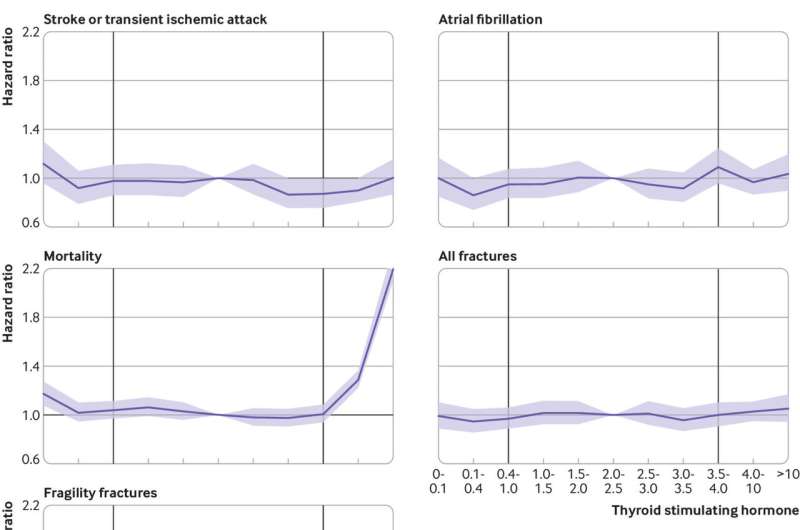Study validates guidelines on treating patients with an underactive thyroid

A study led by the University of Birmingham provides strong support for current recommendations on treating patients with an underactive thyroid and validates latest UK and US guidelines, say researchers.
The retrospective cohort study, published in the BMJ, analysed anonymous GP records of over 162,000 patients who have been diagnosed with hypothyroidism—a highly prevalent condition more commonly known as an underactive thyroid.
It is a condition in which the thyroid gland does not produce enough hormones, and common symptoms are tiredness, weight gain and feeling depressed. In the UK, it affects 15 in every 1,000 women and one in 1,000 men. Children can also develop an underactive thyroid.
There's no way of preventing an underactive thyroid and most cases are caused either by the immune system attacking the thyroid gland and damaging it, or by damage to the thyroid that occurs during some treatments for an overactive thyroid or thyroid cancer.
If an underactive thyroid isn't treated it can lead to complications including heart disease, pregnancy problems and, although rarely, a life-threatening condition called myxoedema coma. Patients with the condition usually have to have life-long treatment in the form of daily hormone tablets, called levothyroxine, to replace the hormone that the thyroid is not making.
Dr. Rasiah Thayakaran, of the University of Birmingham, explained: "It can take a while to get the right dose of levothyroxine and patients have to have regular blood tests to check their levels of thyroid stimulating hormone are 'normal."
"However, currently there is no specific recommended optimum level of this hormone in patients with hypothyroidism; instead guidelines in both the UK and U.S. recommend to health practitioners that the 'normal' level should fall into a wide range of between 0.4 and 4.0 mIU/L.
"The aim of this study was to explore whether certain levels of the hormone would increase the risk of death or illness such as cardiovascular disease and broken bones in patients with an underactive thyroid."
Dr. Nicola Adderley, of the University of Birmingham, added: "We followed patients' records over a 22-year study period, assessing their thyroid stimulating hormone concentrations and analyzing mortality and health outcomes.
"We found that in hypothyroid patients whose thyroid stimulating hormone levels were in the range recommended in current guidelines, there was no evidence of negative long term health outcomes. However, our study suggested that if levels were below or above the current 'normal' range then risk of death or illness was increased."
Dr. Krish Nirantharakumar, of the University of Birmingham, concluded: "Our study provides strong support for the current recommendations on the clinical management of hypothyroid patients and validates with hard evidence the latest American Thyroid Association and British Thyroid Association guidelines.
"The findings support flexibility in treatment dosing for patients with hypothyroidism, but clinicians and patients should recognize the importance of maintaining thyroid stimulating hormone concentration within the recommended range in order to avoid adverse health outcomes."
More information: Rasiah Thayakaran et al. Thyroid replacement therapy, thyroid stimulating hormone concentrations, and long term health outcomes in patients with hypothyroidism: longitudinal study, BMJ (2019). DOI: 10.1136/bmj.l4892

















